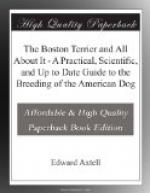Be sure at the time of breeding the bitch is free from worms. A great many are troubled whose owners are totally ignorant of the fact, and this frequently accounts for non-success. Always remember that worms thrive the most when the alimentary canal is kept loaded with indigestible or half-digested food, and that liquid foods are favorable to these pests, while solids tend to expel them. Freshly powdered areca nut, in teaspoonful doses, and the same quantity of a mixture of oil of male fern and olive oil, three parts oil and one part male fern oil, I find are both excellent vermifuges to give to matured dogs. Give a dose and two days after repeat, and this, I think, will be found generally effectual.
Do not, on any account, allow the breeding stock to become too fat. Proper feeding and exercise, of course, will prevent this. It will be found if this is not attended to that the organs of generation have lost their functional activity, and if pups are produced, are, as a rule, small and lack vigor. My experience with Bostons is that it is very desirable to breed them as often as they come in season; if allowed to go by it will be found increasingly harder to get them in whelp. I think a stud dog, to last for a reasonable number of years, should not be used more frequently than once a week. I have found it pays best to give the bitch in whelp a generous feed of raw meat daily. It often effectually prevents the puppy-eating habit.
In closing these general hints on breeding, allow me to say there is no reason whatever, if one has a genuine love for the dog and is thoroughly in earnest in his attentions to it, why the breeding problem should possess any great terrors for him. Perhaps, before closing this chapter, it might be well to write on one or two matters, practically of no special import, but which may at times be instructive and illuminate some few incidents that may puzzle the beginner.
I allude first to that strange phenomena known as “false heat,” to which Bostons, more than any other breed with which the writer is familiar, are liable, and which consists of the bitch coming “in season” between the two periods in the year when she legitimately should do so, and after being warded by the dog, is, of course, not in whelp. The next is somewhat akin to this, and consists of the fact that the bitch, after being properly warded by a dog, notwithstanding all the external evidences of being in whelp, even to the possession of milk in her breasts at the expiration of the ninth week, is not so, neither has she been. If, in addition to the above symptoms, and there has been unusual abdominal, uterine, and breast enlargement, with a discharge of blood for several days and no pups are in evidence, then in this case it may safely be concluded that the offspring fell victims to the puppy-eating habit, in which case a close watch must be kept on the bitch at the next time of whelping, as this is a curable habit generally. I have had two cases




